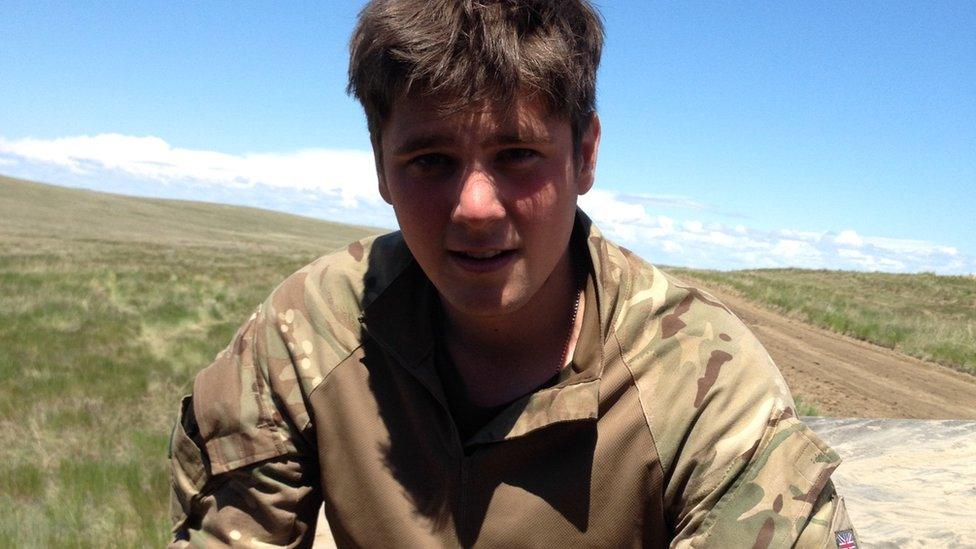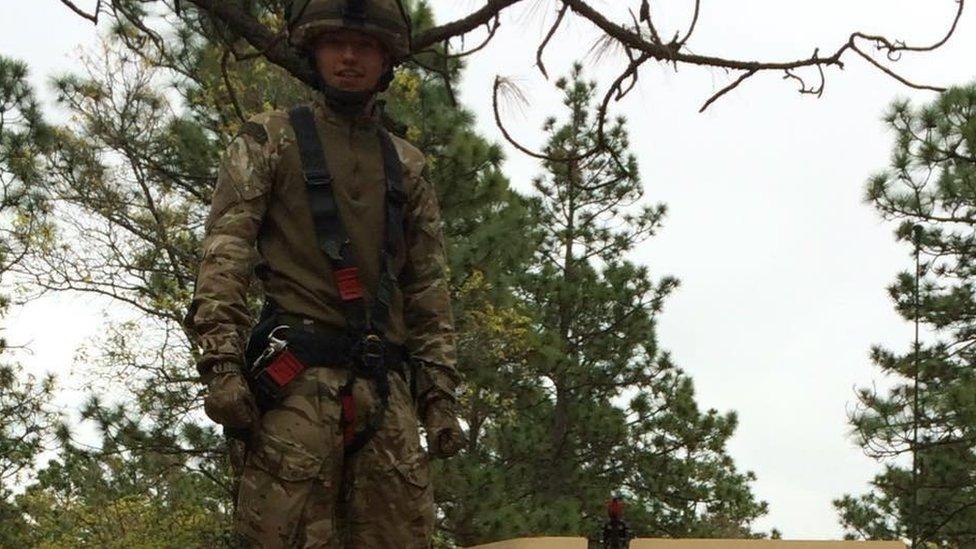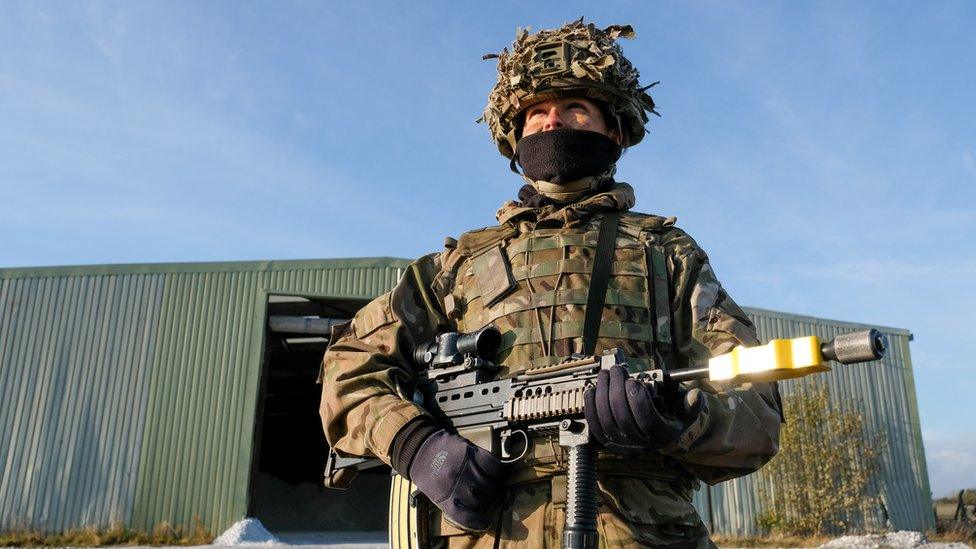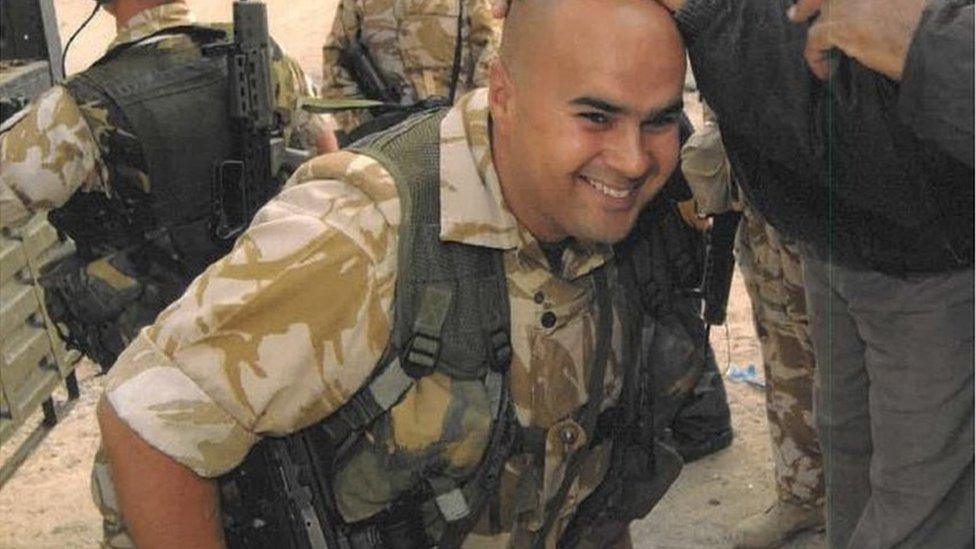Armed forces: 'I left because the job is boring and the pay is terrible'
- Published

Ryan says being in the Army was a "boring" job
Travel the world, make great friends and gain confidence - that's how recruitment adverts portray a career in the armed forces.
But not everyone thinks it's amazing.
"It's just a boring job because there aren't any wars going on," says Ryan Jenkins, who left the Army in 2018.
"All you do is wake up in the morning and pick up rubbish around camp."
Britain's armed forces are short on numbers and, in what is fast becoming a January tradition, the Army has unveiled an advertising campaign to try and encourage new sign-ups.
It says its annual recruitment drives have proved successful - around 90,000 people applied to join in 2019.

The Army's latest recruitment campaign focuses on building confidence
But, despite its best efforts, the regular Army is still 8,000 people short of its target strength and only 10% of applicants make it through basic training.
One of the issues the Army faces is keeping its recruits, according to the BBC's defence correspondent Jonathan Beale.
"I left because the money is terrible," Ryan, 28, tells Radio 1 Newsbeat.
"And in my last year I spent 11 months out of the country away from my family and the accommodation was awful.
"The food is the worst food you'll ever eat in your life."
Army recruiting "snowflakes": What do people think?
Ryan, from Hull, joined the Army when he was 19 but ended up leaving seven years later.
"I don't feel like you're going to get the younger generations to do it anymore, because who wants to go spend six months getting shouted at during training for £13,000 starting pay?"
Keeping recruits is a problem shared across the entire armed forces - with more people leaving (14,880) than joining (13,520) in 2018.
A survey carried out by the Ministry of Defence, external found less than half of people in the armed forces (46%) were satisfied with service life.
Richard Smith, 27, has a similar story, but in the RAF.
He joined in 2013, intending to stay for 12 years, but dropped out after only five.
"You sit around in the canteen, watch Jeremy Kyle and drink about 30 cups of tea. You get so bored," he says.
"When it's boring, people get a chance to sit down and think about whether the grass is greener somewhere else."

Richard says the forces need to appreciate their recruits more
In February last year, it was revealed the MoD has a funding black hole of at least £7bn in its 10-year plan to equip the UK's armed forces.
Richard says the lack of money in the armed forces was also a factor in his decision to leave.
"You'd have toilets that were leaking in the main accommodation block, washing machines that wouldn't work.
"You report the problem but then you just get put on a list. So sometimes you could go weeks without having a toilet that works."
Richard says you do get some "good opportunities" to travel and take part in sports if you're part of the armed forces.
He went over to Canada to do mountain biking and also went surfing in Cornwall during his time with the RAF.

Richard says he's "happier" now he works as a farmer
Richard now works as a farmer and thinks that a bit more recognition for those in armed forces would help to keep recruits.
He says sometimes all you get is a "Thanks, good job" when you've been involved in something particularly tough.
"I know it sounds a bit petty but just a bit more appreciation for the people who do the job would be huge."
Ryan has also adjusted to civilian life and works as a telecoms engineer.
He thinks there are a few simple things the forces could do to keep people on.
"You need to offer people more incentives to get promoted and earn more money.
"The other problem is that it can become a breeding ground for bad egos. And if your face didn't fit your life was hell."
An MoD spokesperson said the armed forces offer "exciting and varied careers, with unparalleled opportunities to learn new skills such as leadership and teamwork".
"We are working hard to make the armed forces an even more attractive place to work, introducing flexible working, modernising accommodation options, and securing the biggest pay rise since 2007."


Follow Newsbeat on Instagram, external, Facebook, external, Twitter, external and YouTube, external.
Listen to Newsbeat live at 12:45 and 17:45 weekdays - or listen back here.
- Published2 January 2020

- Published16 August 2019

- Published3 January 2019

- Published6 September 2019

- Published19 December 2019
